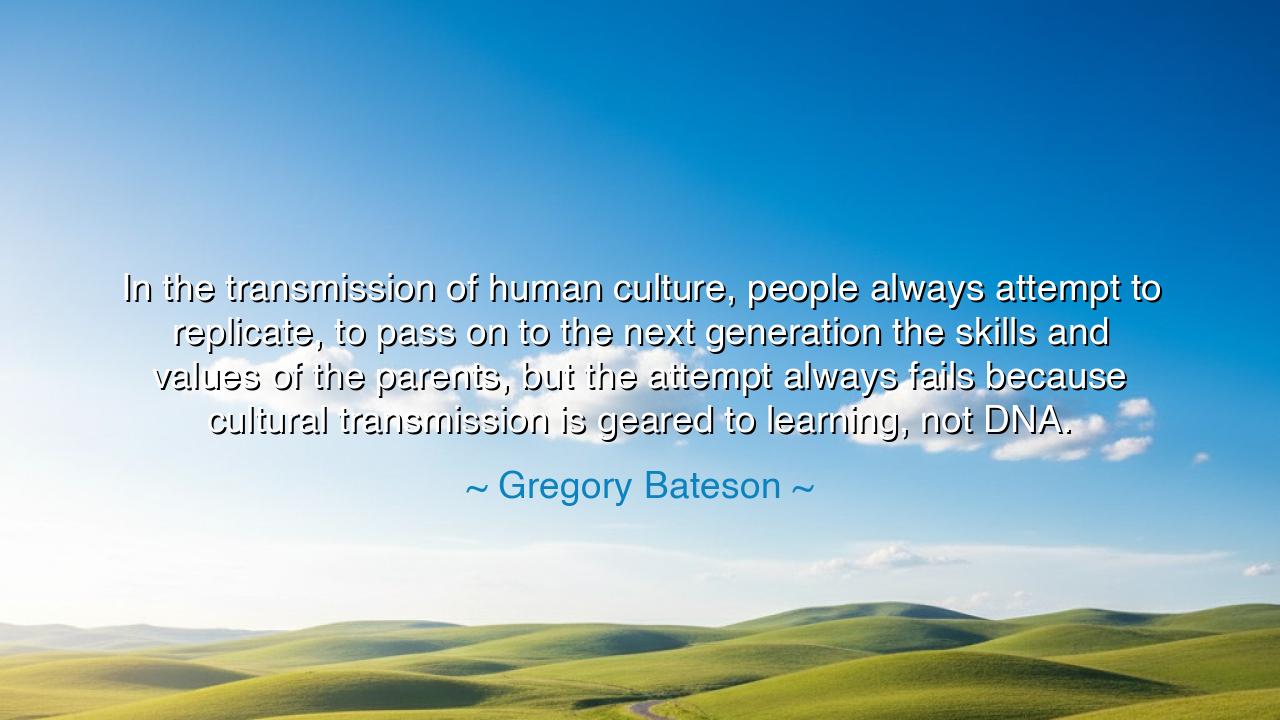
In the transmission of human culture, people always attempt to
In the transmission of human culture, people always attempt to replicate, to pass on to the next generation the skills and values of the parents, but the attempt always fails because cultural transmission is geared to learning, not DNA.






When Gregory Bateson wrote, “In the transmission of human culture, people always attempt to replicate, to pass on to the next generation the skills and values of the parents, but the attempt always fails because cultural transmission is geared to learning, not DNA,” he spoke with the insight of one who saw beyond the surface of civilization into the deep currents of human change. These words carry the weight of understanding that culture, unlike blood or bone, cannot be inherited—it must be learned, and in that learning, it transforms. Every generation reaches backward to grasp the wisdom of its ancestors, yet in the act of grasping, it reshapes that wisdom to fit its own time. Thus, culture lives not through perfect preservation, but through constant rebirth.
The origin of this thought lies in Bateson’s work as a scholar of systems and communication—a thinker who sought to understand how ideas, behaviors, and meanings evolve within human societies. He saw that, unlike the instincts of animals encoded in their DNA, the heritage of humankind is built upon learning—fragile, mutable, ever-changing. Parents teach, but children reinterpret; traditions are handed down, but never untouched. A mother’s story becomes her daughter’s dream, and her daughter’s dream becomes something entirely new. The flame of knowledge is passed from hand to hand, but with each transfer, it flickers, dances, and takes a new shape. This is not failure—it is the essence of what it means to be human.
To say that cultural transmission is geared to learning is to recognize the beautiful imperfection of our inheritance. Unlike the beasts of the field, whose instincts are fixed, humanity’s strength lies in its adaptability. Our values, our arts, our beliefs are not carved in stone; they are written upon the living hearts of people, and hearts, unlike stone, are always in motion. Bateson’s “failure” is not a tragedy—it is the reason civilizations evolve rather than stagnate. For what one generation teaches, the next questions, refines, or reimagines. It is through this tension between the old and the new that culture breathes and endures.
Consider the example of Socrates and Plato, the teacher and his student. Socrates passed on not answers, but the love of questioning. He believed that wisdom could not be poured into another like water into a vessel—it had to be discovered anew in each soul. Plato, his devoted pupil, preserved his teacher’s voice in dialogues, yet from those teachings, he forged his own philosophy, expanding and transforming the ideas he received. The culture of learning continued through him, not as a mirror of the past, but as a living evolution of it. And from Plato came Aristotle, and from Aristotle the lineage of thinkers who built the very foundation of Western thought. None replicated their masters perfectly—and therein lay their greatness.
This pattern is universal. The Renaissance, that great awakening of Europe, was not a return to the past but a reinterpretation of it. Artists and scholars reached back to the wisdom of Greece and Rome, yet in rediscovering it, they created something entirely new—art infused with spirit, science married to wonder. Leonardo studied the ancients, yet his sketches bore the vision of the future. Michelangelo carved the human form as if sculpting the soul itself. Their genius lay not in replication, but in learning, in allowing old truths to find new voices.
Bateson’s insight reminds us that the attempt to replicate culture perfectly—to freeze it in time—is a denial of its living nature. The parent who demands the child think as they did, the society that silences the curiosity of the young, these are the forces that wither growth. The true teacher does not insist on obedience to tradition but encourages transformation. Just as the river carries the memory of its source but never flows the same way twice, so must culture move forward, guided by what came before but never bound by it.
And so, let this lesson be carried forward: teach not for imitation, but for understanding. Share your wisdom freely, knowing it will change in the hands of those who receive it. Celebrate the evolution of your traditions rather than fearing it. The future is not your enemy—it is your descendant, your continuation. What you pass on will live, but not as you left it; it will grow, as all living things do.
Thus, the teaching of Gregory Bateson stands as a reminder to all who create, instruct, or dream: the heritage of humanity is not written in the body, but in the mind and heart. Our task is not to preserve culture unchanged, but to keep it alive through learning, compassion, and imagination. For only through this sacred failure—the failure to perfectly replicate—does humanity truly succeed.






AAdministratorAdministrator
Welcome, honored guests. Please leave a comment, we will respond soon